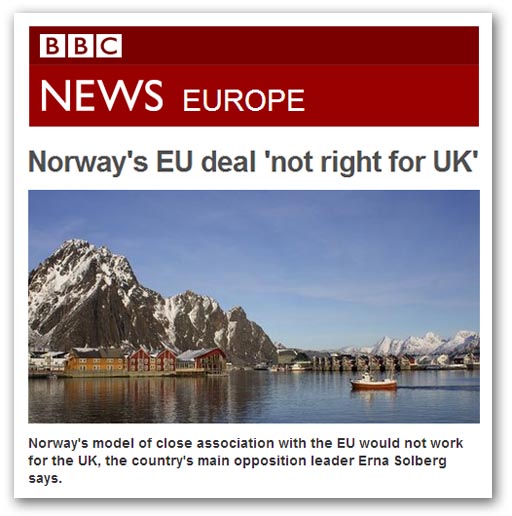Interestingly, though, the establishment politicians in Norway hate the idea of EFTA/EEA membership – they would much rather have their country join the EU. And no more so does this apply than to the Conservative opposition.
Therefore, it is entirely unsurprising that the LSE should invite opposition leader Erna Solberg to give them a lecture telling them that the so-called Norwegian option "is not right for the UK". It is equally unsurprising that the BBC should publicise her speech.
Listening to the speech, what came over was a politician filled with regrets that her countrymen had twice rejected EU membership. She thus painted the blackest picture she could of her country's EEA membership, emphasising the fact that Norway had "no voting rights in the EU – it is not at the negotiating table".
Solberg even tried on the payments canard, stating that Norway contributed €204 million annually to the budget, not stating that 80 percent of that is contributed voluntarily to finance its participation in the EU's research programmes.
This one-dimensional, and fundamentally dishonest view is very much in character for the europhile Norwegian establishment. Nothing comes over of how influential the Norwegians are in international organisations, which so often set the agenda which the EU has to follow.
Not indeed does Solberg spell out the downside of EU membership in any detail, neglecting to say that the richest cod fishery in the world would become a common EU resource, with an estimated catch value of €2 billion and a huge amount of added value from processing.
The very last thing we are going to get out of the europhiles, though, is an honest debate, which is why we are going to have to pursue the arguments ourselves. But be in no doubt, EEA membership – at least as a temporary expedient – is an excellent option for the UK on leaving the EU, giving us time to "park" the Single Market issue, while we search for more durable alternatives.
And we must also not neglect that distinct probability that, if we were to leave the EU and work through EFTA/EEA, additional countries would undoubtedly follow, making the group much more powerful and able to negotiate better terms with the rump of the EU.
This, though, is caught up in the propaganda game and will not be rehearsed by the europhiles. But at least we can take some comfort from the fact that, if both the BBC and the LSE are telling us that the "Norwegian option" is not a good idea, then it must have a lot going for it.
COMMENT THREAD
